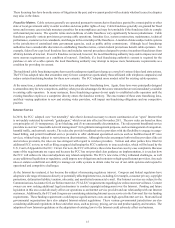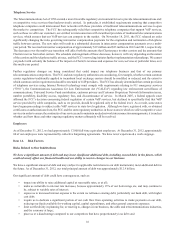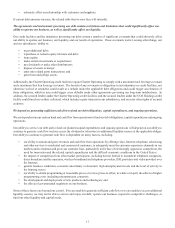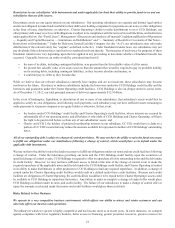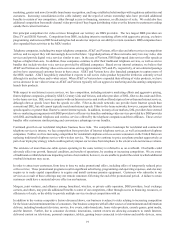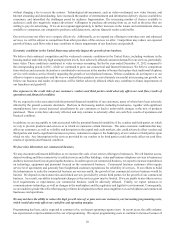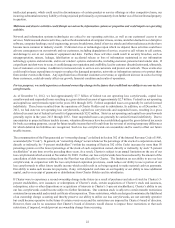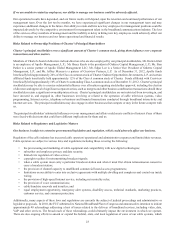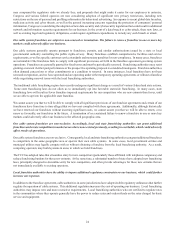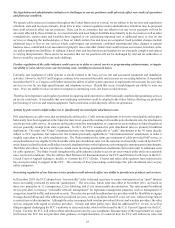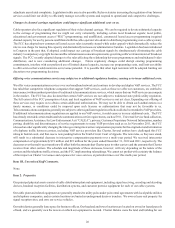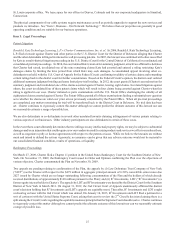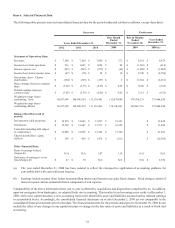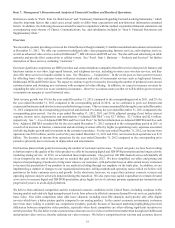Charter 2012 Annual Report Download - page 36
Download and view the complete annual report
Please find page 36 of the 2012 Charter annual report below. You can navigate through the pages in the report by either clicking on the pages listed below, or by using the keyword search tool below to find specific information within the annual report.24
may compound the regulatory risks we already face, and proposals that might make it easier for our employees to unionize.
Congress and various federal agencies are now considering adoption of significant new privacy restrictions, including new
restrictions on the use of personal and profiling information for behavioral advertising. In response to recent global data breaches,
malicious activity and cyber threats, as well as the general increasing concerns regarding the protection of consumers’ personal
information, Congress is considering the adoption of new data security and cybersecurity legislation that could result in additional
network and information security requirements for our business. In the event of a data breach or cyber attack, these new laws, as
well as existing legal and regulatory obligations, could require significant expenditures to remedy any such breach or attack.
Our cable system franchises are subject to non-renewal or termination. The failure to renew a franchise in one or more key
markets could adversely affect our business.
Our cable systems generally operate pursuant to franchises, permits, and similar authorizations issued by a state or local
governmental authority controlling the public rights-of-way. Many franchises establish comprehensive facilities and service
requirements, as well as specific customer service standards and monetary penalties for non-compliance. In many cases, franchises
are terminable if the franchisee fails to comply with significant provisions set forth in the franchise agreement governing system
operations. Franchises are generally granted for fixed terms and must be periodically renewed. Franchising authorities may resist
granting a renewal if either past performance or the prospective operating proposal is considered inadequate. Franchise authorities
often demand concessions or other commitments as a condition to renewal. In some instances, local franchises have not been
renewed at expiration, and we have operated and are operating under either temporary operating agreements or without a franchise
while negotiating renewal terms with the local franchising authorities.
The traditional cable franchising regime has recently undergone significant change as a result of various federal and state actions.
Some state franchising laws do not allow us to immediately opt into favorable statewide franchising. In many cases, state
franchising laws will result in fewer franchise imposed requirements for our competitors who are new entrants than for us, until
we are able to opt into the applicable state franchise.
We cannot assure you that we will be able to comply with all significant provisions of our franchise agreements and certain of our
franchisors have from time to time alleged that we have not complied with these agreements. Additionally, although historically
we have renewed our franchises without incurring significant costs, we cannot assure you that we will be able to renew, or to
renew as favorably, our franchises in the future. A termination of or a sustained failure to renew a franchise in one or more key
markets could adversely affect our business in the affected geographic area.
Our cable system franchises are non-exclusive. Accordingly, local and state franchising authorities can grant additional
franchises and create competition in market areas where none existed previously, resulting in overbuilds, which could adversely
affect results of operations.
Our cable system franchises are non-exclusive. Consequently, local and state franchising authorities can grant additional franchises
to competitors in the same geographic area or operate their own cable systems. In some cases, local government entities and
municipal utilities may legally compete with us without obtaining a franchise from the local franchising authority. As a result,
competing operators may build systems in areas in which we hold franchises.
The FCC has adopted rules that streamline entry for new competitors (particularly those affiliated with telephone companies) and
reduce franchising burdens for these new entrants. At the same time, a substantial number of states have adopted new franchising
laws, principally designed to streamline entry for new competitors, and often provide advantages for these new entrants that are
not immediately available to existing operators.
Local franchise authorities have the ability to impose additional regulatory constraints on our business, which could further
increase our expenses.
In addition to the franchise agreement, cable authorities in some jurisdictions have adopted cable regulatory ordinances that further
regulate the operation of cable systems. This additional regulation increases the cost of operating our business. Local franchising
authorities may impose new and more restrictive requirements. Local franchising authorities who are certified to regulate rates
in the communities where they operate generally have the power to reduce rates and order refunds on the rates charged for basic
service and equipment.



